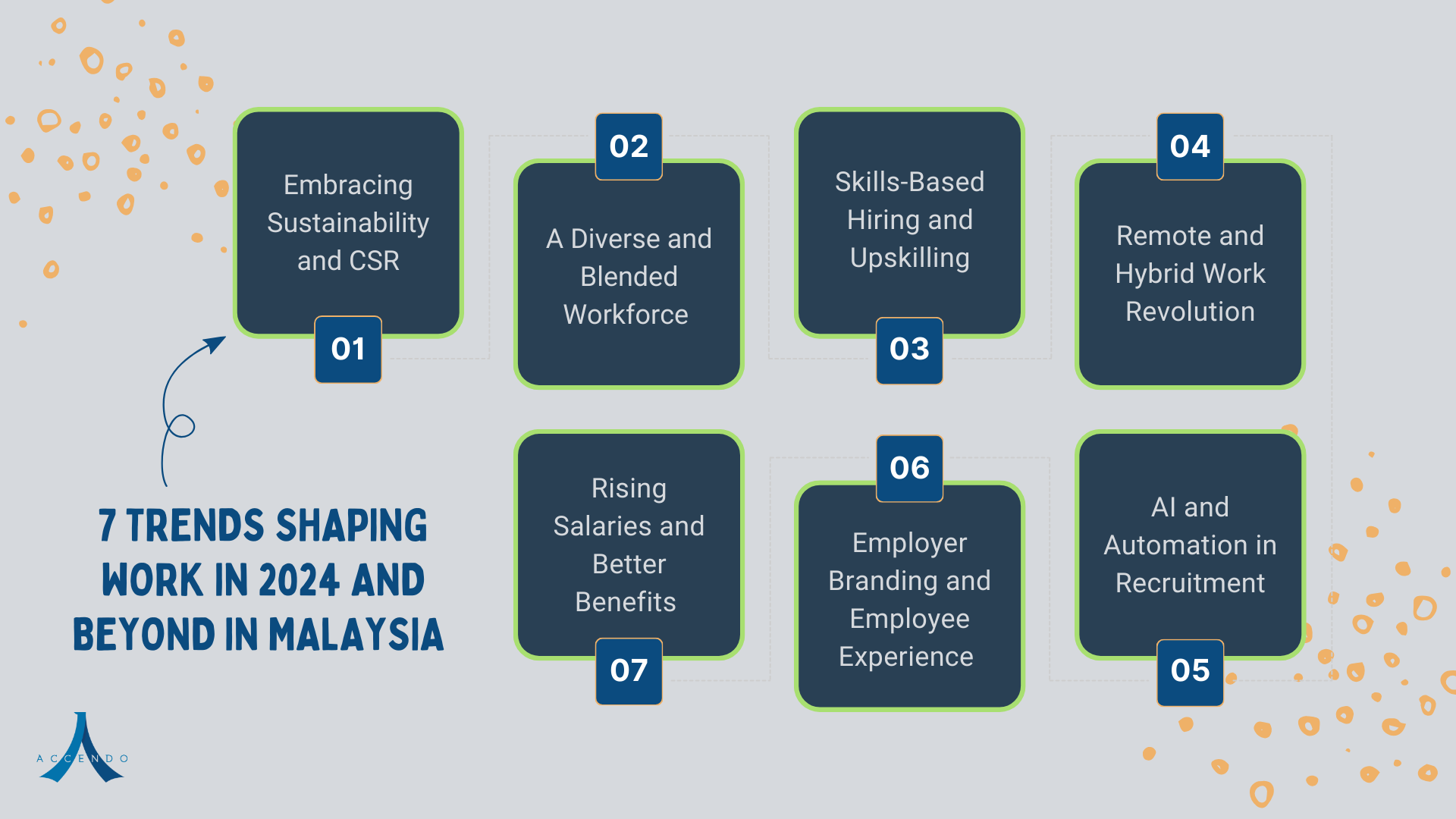In 2023, companies continued to face significant challenges, from inflation to geopolitical turmoil to concerns about AI and automation in the workplace as well as a call for hybrid work policies — and 2024 is no less attractive in that arena. We have identified seven key trends, from embracing sustainability and CSR to rising salaries and better benefits, that will impact work this year. Employers who successfully navigate these will retain top talent and secure a competitive advantage for themselves.
Introduction
In 2023, business leaders and companies continued to contend with major shifts affecting the workplace. The pressure of inflation on both employer and employee budgets, the emergence of generative AI (GenAI), geopolitical turmoil, demands for remote work or hybrid work policies, a shifting legal and societal landscape for diversity, and the call for skill-based hiring and upskilling are some concerns that are top of mind.
2024 has come but we can expect disruption to continue. We have identified seven trends that will shape work in the next year. Business leaders who proactively develop explicit business and talent strategies to navigate these trends will give their companies a competitive advantage in both talent outcomes and achieving their strategic goals.

Embracing Sustainability and CSR
Companies are incorporating sustainability and corporate social responsibility (CSR) into their recruitment strategies. This reflects a growing emphasis on ethical practices and environmental consciousness.
Employees are increasingly drawn to organisations that demonstrate a commitment to making a positive impact on society and the planet. By integrating sustainability and CSR into their core values, companies not only attract top talent but also build a positive brand reputation.
A study by Nielsen found that 81% of global respondents feel strongly that companies should help improve the environment. In Malaysia, a survey by PwC revealed that 60% of Malaysian consumers prefer to buy products from companies that are committed to positive social and environmental impact. This trend is driving companies to integrate sustainability and CSR into their recruitment strategies.
A Diverse and Blended Workforce
Companies are increasingly valuing diversity and inclusivity.
According to McKinsey & Company, companies in the top quartile for ethnic and cultural diversity on executive teams were 36% more likely to have above-average profitability. And blending full-time employees, freelancers, and gig employees creates a dynamic workforce that brings varied skills and perspectives. This diverse and blended approach allows companies to be more agile and responsive to market changes.
Additionally, a Deloitte survey found that inclusive companies are 1.7 times more likely to be innovation leaders in their market. This data underscores the value of a diverse and blended workforce.
By fostering an inclusive environment, businesses can leverage the unique strengths of their workforce, drive innovation, and improve overall performance.
Skills-Based Hiring and Upskilling
Employers focus on candidates’ skills rather than just qualifications. Upskilling initiatives help employees adapt to changing job requirements and stay relevant. LinkedIn’s 2023 Workplace Learning report supports that as 94% of employees would stay at a company longer if it invested in their career development.
Moreover, a World Economic Forum report stated that by 2025, 50% of all employees will need reskilling due to the adoption of new technologies. These statistics highlight the importance of skills-based hiring and continuous upskilling.
As the pace of technological advancement accelerates, the demand for new, specialised skills grows. By prioritising skills-based hiring and continuous learning opportunities, organisations can ensure they have the right talent to meet evolving business needs and maintain a competitive edge.
Remote and Hybrid Work Revolution
The pandemic accelerated the adoption of remote and hybrid work. Today, employees have come to expect that companies will continue to offer flexible work arrangements, emphasising the need for work-life balance and productivity.
Remote and hybrid work have become a permanent fixture in the modern workplace, providing employees with greater flexibility and autonomy. A study by Buffer’s State of Remote Work report found that 97% of remote employees would recommend remote work to others, and 98% want to continue working remotely, at least some of the time, for the rest of their careers. Additionally, Gartner research indicates that 82% of company leaders plan to allow remote work some of the time as employees return to the workplace.
This shift not only enhances employee satisfaction but also allows companies to tap into a global talent pool, reduce overhead costs, and improve overall efficiency.
AI and Automation in Recruitment
According to Deloitte’s 2024 Global Human Capital Trends report, 71% of companies are using AI in their HR functions, including recruitment. Artificial intelligence can help to streamline recruitment processes, from resume screening to candidate matching.
At the same time, it enhances efficiency and reduces bias. AI-driven tools can analyse vast amounts of data to identify the best candidates quickly and accurately. A study by the Society for Human Resource Management (SHRM) found that 67% of HR professionals believe AI has improved the candidate experience. These findings demonstrate the growing role of AI in recruitment.
By automating repetitive tasks, recruiters can focus on more strategic activities, such as engaging with candidates and building strong relationships. This technology also helps reduce unconscious bias, promoting a fairer and more inclusive hiring process.
Employer Branding and Employee Experience
Companies invest in creating a positive employer brand and enhancing the employee experience. This includes benefits, work culture, and career growth opportunities. A strong employer brand attracts top talent and retains existing employees by fostering a sense of belonging and purpose.
That said, a Glassdoor survey revealed that 77% of adults would consider a company’s culture before applying for a job, while 56% said company culture is more important than salary. Companies that prioritise employee experience through comprehensive benefits, a supportive work culture, and clear career development paths are more likely to build a loyal and motivated workforce.
Additionally, IBM’s Employee Experience Index showed that positive employee experience is linked to a 40% increase in effort and a 20% increase in employee performance.
Rising Salaries and Better Benefits
Salaries are expected to rise steadily, and companies offering improved benefits are likely to attract and retain top talent. Competitive compensation packages are crucial in a tight labour market where skilled employees have multiple options.
The Robert Walters Salary Survey 2023 reported that salaries in Malaysia are expected to increase by 3-5% on average across various sectors. Additionally, a survey by Randstad found that 76% of Malaysian employees consider attractive salaries and benefits as a key factor when choosing an employer.
By offering attractive salaries and comprehensive benefits, including health and wellness programs, flexible work options, and professional development opportunities, organisations can differentiate themselves and secure the best talent available.
What’s Does This Mean for You?
These seven trends will shape the future of work across 2024 and beyond. Executives must evaluate which of these trends to prioritise and pilot based on criteria including:
- Which trends will disproportionately impact your organisation?
- Which trends might give you a strong comparative advantage in the labour market if your organisation acted on them?
- Which trends pose a threat to your strategic goals if you don’t act on them?
While most companies cannot act on all these trends, those that don’t prioritise and act on some will find themselves at a disadvantage — both in terms of talent retention and attraction, as well as their ability to meet strategic goals.
By proactively addressing these trends, businesses can not only navigate the complexities of the modern workplace but also thrive in an increasingly competitive and dynamic environment.
Page Contents






